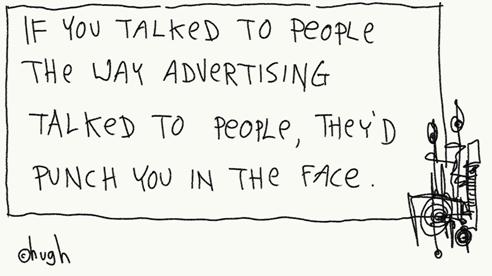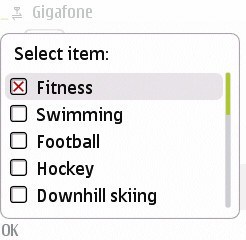Ask, don’t tell – the golden rule for mobile advertising 2.0

The above cartoon by Hugh MacLeod is one of my favourites, and my friend and fellow mobile advertising evangelist, Jonathan MacDonald also uses it in his presentations (and pointed me to Hugh’s great work).
It says so much about the state of mobile advertising, and why the critics still say it is not working. The latest MMA study points to increased receptiveness but we’re still not there as long as we treat mobile advertising as just an extension of the internet, and the broadcast model.
The key with advertising in the new world (across all mediums) is to ask permission. Consumers are becoming more and more savvy, and able to actively tune out advertising anyway, so if as an industry we want to connect with people who we think might like (and buy) our products, then something fundamental has to change.
Asking for permission is not easy in any relationship (think about the first time you asked your partner out – you were probably a bit nervous as to the response), let alone one that is ultimately a commercial relationship where one party seeks to benefit over the other.
A recent post on MSearchGroove by James Cameron highlights how mobile advertising pioneers such as Admob are now talking about engagement rather than broadcast. James’ post highlights a story where AdMob’s Russell Buckley was extremely inconvenienced by his credit card provider, so has now changed providers as a result.
Taking a direct quote from the post:
“….The mobile device is first and foremost a communication tool, not a broadcast channel. If you enable communication and dialogue, then users will tell brands what they want, when they want it and also when they don’t, which in turn creates a scenario where marketing becomes a user controlled service.”
When things happen to US we often only then think about how it might affect other people. When I present at conferences I always challenge the room to take whatever they are talking about to the front desk of the hotel and ask the person behind the desk if they would use their service – if they say “no” then you know you’re in trouble.
The thing is that it will take more than just Jonathan and myself and others to keep banging on about seeking permission to advertise to change the industry. To the traditional AdMan (or Ad Person) it’s all about telling them via a broadcast medium. With mobile though – this just won’t wash.
With mobile we have a golden opportunity to open up the communication channels
 One of my clients, Gigafone is operating firmly within the 3 P’s of mobile marketing – as outlined by Jonathan MacDonald of privacy, preference and permission.
One of my clients, Gigafone is operating firmly within the 3 P’s of mobile marketing – as outlined by Jonathan MacDonald of privacy, preference and permission.
What I really like about the Gigafone proposition is that the mobile application ASKS the user what they are interested in (see an example on the left) – hence using their preferences in a meaningful way.
Once the user has told the application a bit about themselves, the solution presents full screen, engaging and exciting mobile ads when the phone rings or an SMS is received.
Importantly the solution does not in any way impact how they use the phone – they still can answer the call or SMS and then go back the ad (which is absolutely relevant to their profile) one they have finished the call.
The solution has been successfully deployed in Russia to 600,000 users who receive a benefit (extra minutes, SMS or free content) from their mobile operator for every ad they view.
Large brands are also very interested in the concept because with a clever dialogue between the user and the brand, relevant offers can be sent to the mobile phone in the form of coupons, discounts and special offers that are of direct benefit. In a downturn, show me a consumer who does not want to save money.
Companies such as Tesco with their successful Clubcard could enhance their CRM tools exponentially by asking their customers for their preferences up front (via the mobile), instead of having to mine billions of transactions to then guess what they are interested in.
Sending coupons via the return path of the mobile has also got to be more effective than sending out coupons in the mail. Tesco – please contact me – I can help you save millions of ££ and generate even happier customers!
The point I am trying to make is that mobile advertising 2.0 is a new way of looking at traditional advertising and it is a disruptive play – but one that needs to happen. Users will become frustrated if all they receive are banner ads while they are browsing that have no relevance to what they are looking for, or is aligned with their interests.
Shown below is a recent mobile ad I received while browsing the internet – served from a well known ad network. I can’t begin to explain how much of a FAIL this is on so many fronts – an example of a completely irrelevant, offensive and untargeted ad on my mobile. No wonder people thing mobile advertising has a long way to go.

If we ask, we may be surprised with the response. If as advertisers we are clear about what the benefit is, then users will be encouraged to tell us a little about themselves, in exchange for a benefit AND be delighted when the advertising they receive is actually of interest to them. The mobile is best placed to be the way to ask permission, respect privacy and provide for preference.
Two great examples of this – the first is from Blyk, where I am told anecdotally that subscribers to their service don’t see the advertising as ads – they see it as content because it is relevant to them (Blyk is an ad-funded MVNO for 16-24 year olds and like Gigafone they also ask the user for their preferences).
The second great example is my Wife Samantha. She said to me recently that “there are no ads on Google” – and she is right. When she is searching for something particularly relevant to her (antique furniture) the results she sees are actually ads (companies have paid in one way or another to appear there) but she sees the results as content. This is because she has told Google what she’s interested in and Google have returned the most relevant results.
Why then in 2008 do we treat people as “receivers” who we think willingly consume our ads? It goes back to Hugh’s great cartoon above
“If you talked to people the way advertising talked to people, they’d punch you in the face.”
When it comes to mobile advertising, let’s ask – don’t tell.
If you’d like to know more about Gigafone, please contact me. I will also be presenting at the Future of Mobile event on Monday 17th November in London, and also on a Panel and Chairing a whole day at the IIR Mobile Content Conference in London 18 – 21 November. I’d love to hear from you or meet you in person at any of these events.
